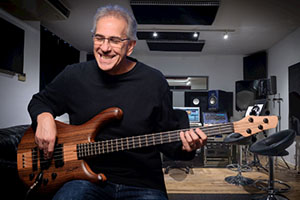Maintain that focus of making the music feel good
By Jon Liebman
November 10, 2023
While trying to learn bass, have you ever listened to James Jamerson, Bernard Edwards or Rocco Prestia, etc., and said to yourself, “Oh, what’s the use? I can never play like that.”
First of all, you might come closer than you think.
More importantly, though…
You don’t have to.
The role of the bass player in the band
Your focus should be on locking in with the drummer, setting the foundation for the band, and making the music feel good.
Those are the qualities of a great bass player. The goal of learning bass isn’t playing blistering 16th-note runs at a hundred miles an hour. The goal is to make the music groove.
I’m not saying learning bass is easy or that anyone can do it. I’m saying it’s not as hard as a lot of people think.
Perspectives on learning bass
I had an awesome conversation with Kyle Eastwood last month, published as this week’s FBPO interview. Kyle, the son of actor/film director Clint Eastwood, is a great bass player and composer and has contributed a lot of music to his father’s films.
In addition to getting the scoop on Kyle’s just-released Eastwood Symphonic album, a tribute to the music of his dad’s movies, we talked about playing bass. Specifically, learning bass.
Developing good technique
I told Kyle about fast-growing number of students from all over the world coming to For Bass Players Only every day to learn how to play bass.
I also mentioned that most of those students are over 50 or 60, and made a comment on how the older we get, the more likely it is that we start to experience the annoyances of arthritis, tendonitis, etc.
“I think it’s good to start off with good technique,” Kyle says, “to execute things and not hurt yourself. That’s important because, like you said, with tendonitis and things like that…”
As so many of my students will attest, there are definitely ways to build bass technique without hurting yourself. The key is to proceed slowly, gradually, at your own pace, while listening to what your body is trying to tell you.
Listen to great bass lines
Kyle learned a little guitar when he was about 13, for a film he did with his dad, before eventually gravitating to bass.
“I picked up bass, electric bass,” he says, “and started teaching myself how to play it, just listening to records, listening to great bass lines and trying to figure out how to play them.”
Learning great bass lines is an excellent way to start developing your own “groove vocabulary” as you learn to understand what other great bass players have done. Again, take your time and learn as you go, little by little.
Don’t be discouraged if you can’t nail a groove right off the bat. Give it time. It’ll come.
Make the music feel good
Having gone quite far with the bass, Kyle knows all about locking in with the drummer and making things groove.
“I think the most important thing for bass and drums is to really feel good,” says Kyle. “It doesn’t matter how busy it is or how much crazy harmonic movement you’ve got going. If it doesn’t feel good what’s the point?”
So true. You never want to sacrifice a great groove in exchange for “chops for chops’ sake.” In most cases, the simpler you play, the better for the music.
Let the music breathe. It’ll actually make you sound like a more confident player.
Keep it simple
I told Kyle how I’m always impressing upon my students that even a super simple bass line can make the music feel great and that you don’t have to be some kind of daredevil athlete to learn bass and make the music groove.
“I think it has to it has to sit well and feel good,” Kyle says. “Sometimes simpler is better. Less is more.”
In other words, don’t play it if it doesn’t help the song. It’s amazing how playing fewer notes can often make the groove feel so much better.
How about you?
Have you ever had trouble finding the right balance between building bass technique and making the music feel good? How are you managing that? Leave a comment below and share you situation. And be sure to check out my interview with Kyle here.


Great advise…I’ve been playing bass over 60 years and I have always lived by advise like this. The best notes are the ones you don’t play…
Thanks, Mike. 60+ years? Wow, good for you! You’re an inspiration to us all.
Great read. I was asked recently to lay down some lines for a young musician. The whole not needing 16 notes where 4 were fine is so spot on. Been playing since 1968 and at 72 still know less can surely be best.
Glad to hear it, John. Thanks!
Great interview. I am heeding the advice about less is best.
Thanks, Neil. Glad to hear it!